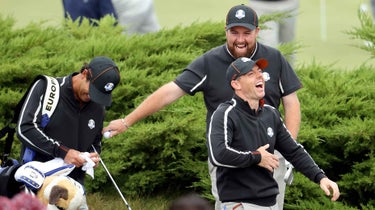Miles Russell became the youngest player to make the cut in the 35-year history of the Korn Ferry Tour when the 15-year-old posted a 5-under 66 Friday in the Lecom Suncoast Classic.
‘The essential existential question’: My crisis … after my first-ever golf lesson

The author took his first-ever lesson recently and is facing a crisis. One of his new advisers called it “the essential existential question.”
The post ‘The essential existential question’: My crisis … after my first-ever golf lesson appeared first on Golf.
The author took his first-ever lesson recently and is facing a crisis. One of his new advisers called it “the essential existential question.”
The post ‘The essential existential question’: My crisis … after my first-ever golf lesson appeared first on Golf.
‘Are you swinging in the mirror?” — my wife, upon seeing me, in fact, swinging in the mirror.
“No.” — me, lying.
There’s no way around this one, is there? Back was bent. Hips were turned. Shoulders were turned. Arms were flared out. Wrists were cocked. And there I was, frozen, staring back at the image behind me, and there my wife was, confused, looking at the oddity in front of her.
We, the golf obsessed, are all guilty of this. Mirrors are but a window to our deepest swing thoughts. And they’re for brushing our teeth. But my self-reflective tutorial was different. You see, I took golf lessons last year.
For the first time. And I started playing when I was 14.
And I have a certain way of moving the club back. And through. And I was OK.
But I was shown the right way. And it was great.
For like every 10th swing.
So here we are. With a problem. And it’s not swinging in the mirror at 1 a.m. on a Tuesday, though we should probably address that at some point, too. But this is bigger. It’s a crisis! To borrow football terms, it’s this:
Do I punt? Or do I go for it? Do I give up on the knowledge gained through my lessons and stick to old reliable? Or do I give that up and really try to improve, knowing that it may take a long while — or that I may even digress?
Deep one, right? You’ve probably asked these kinds of questions elsewhere in life, too. Careers. Relationships. A lot. And all that’s too big for just me, so I asked for help. To a special group of folks, I recently asked this:
You are going to be my golf coach! (Lucky you!) Here’s my problem. I’ve been playing golf since I was 14. That’s a long time. I also taught myself how to play. And that’s a long time of possibly swinging the clubs correctly, swinging the clubs incorrectly, or a little bit of both. I decided to find out this year. I’m pretty proud of where I’ve gotten my game — low to middle 80s — but had hit a plateau, and I started to wonder if the homemade swing was the issue. So I took a lesson — and asked Coach to show me the right way, from head to toe. It was hard. A lot was wrong. But then, maybe every 10th swing or so, it was pure. Pure, pure, pure. But that’s batting .100. It would need a lot of work.
And now here is where you come in.
Should I stick to what I know? Don’t get me wrong: Golf is still very enjoyable. But I’ve hit the wall. And I’ve been teased.
Should I start from scratch? Again pure. Pure, pure, pure. But to get there, it might mean a lot of time at the range. And maybe no actual course play.
What do you think? Gimme a couple sentences. Gimme me a book. Whatever. Thanks, golf coach!
Here are their responses. I hope it helps you as much as it will me. And if you have a thought of your own, I’d love to hear it over email (nick.piastowski@golf.com) or Twitter DM.
As for what I’ll decide, stay tuned! But first, the advice.
Sara, my wife, who’s still with me despite the mirror thing: You know what you should do; I’ve been telling you for weeks: Commit to the new swing! You might still get all crabby in the middle of a round, but at least it will be for a new reason.
Josh, my New York golf buddy, who still plays with me despite my whining: I would start from scratch, but I’m a more volatile golfer than you. There is something admirable about being consistently in the 80s, but I don’t think I would ever be happy with my game if there was always something gnawing at me about my swing and its results. I do not think the short-term sacrifice of rounds on the course should hinder the long-term satisfaction of being happy with your swing, and the scores will come back around. You’re not going to forget how to chip and make putts, so you have the core of a good score built-in.
Josh Sens, one of my amazing GOLF.com colleagues: Those are questions I’ve wrestled with for a long while now. I would say they are pretty much the essential existential questions every golfer asks at one point or another. The only difference is degree.
I didn’t start playing golf in any serious way until my 20s, and my swing is an ugly self-taught thing — a Rube Goldberg collection of weird and wasted motions meant to serve what should be a pretty simple purpose. When I started writing about golf about 20 years ago, I started taking lessons here and there. I’ve now had more than I can count. Mostly, what I’ve asked for — and received — are Band-Aids. Some have worked. Some haven’t. Some have stuck. Most have come off quickly. Abandoned or forgotten. I’ve gotten decent. For a few years, in my early 40s, my index got down to a 1. But it always looked ugly. I wanted to be pretty. I didn’t really care that I could shoot in the low 70s from time to time and occasionally break par. I wanted to not look like such a hack. As Johnny Miller once said of Craig Parry, my swing would make Ben Hogan puke. That bugged me for a long time.
Now, at 55, I’ve come to the conclusion that if I were ever going to make any great improvements, I would need to make some major changes that would almost feel like starting anew. No Band-Aids. I’d have to be willing to get much, much worse for a pretty long spell with the hope of coming out a better golfer at the other end. For me, personally, I’m not sure it’s worth it. If you wanted to be cynical about it, you could say that I’ve given up. But if you’re feeling more generous, you could say that I’ve come to a comfortable place with myself and my game. I can still play decently from time to time. But mostly, what I want to do is get out and enjoy myself with friends and get some exercise. Sure, I’d like to get consistently better. But that would take a sacrifice that I’m not sure I have the time and energy to make. (In fact, I’ve had a few trusted instructors over the years who have given me very specific advice on the bigger changes I need to make. But I’ve never put in the time to make them. My failure to become a pretty golfer is entirely on me. Not on them).
So, what should you do? It depends. Everyone is different. What are your goals? How much does getting better matter to you? Are you willing to get significantly worse for a while before you get better? If you’re not willing to make that sacrifice, I’m not sure a complete reconstruction is the way to go. Prolly better to find an instructor who can help you with little tweaks here and there. Like getting new tires on your car instead of building a new custom rig from parts. I would find a good instructor who could help you with that. A good pro who is being honest with you will tell you what kind of changes they think you need to make to achieve the goals you want to reach. Maybe you can get there simply by becoming a better chipper and putter. Maybe you really do need a full overhaul. I’m not expert enough to say. But there are plenty of people out there who are.
I’m rambling here, but that’s the gist. The other relevant factor that not many in the industry talk honestly enough about (in my opinion, anyway) is: How good an athlete are you? Do you have good hand-eye coordination? Or are you a dork? (By the way, it’s OK if you’re a dork. Most sportswriters are. That’s why they write for living).
We’re not supposed to ask those questions aloud, because golf is a game of infinite hope and it depends in part on selling people on the idea of ‘hitting it like the pros.’ Everybody is supposed to have potential. But there are limits. Make a realistic assessment of yours (along with a realistic assessment of your tolerance for hard work/suffering/change, etc) and then decide accordingly.
Jessica Marksbury, one of my amazing GOLF.com colleagues: Boy, did I enjoy reading that, Josh!
Hard to add to what you said — I think you nailed it! But my advice for you, Nick: Stick to what you know. Rebuilding a swing is one of the game’s most daunting prospects. Even some of the world’s best have tried and failed.
I may have personal bias because my swing is a feel swing. My dad used to joke that my swing looks the same now as it did when I was 6 years old. I believe it! The biomechanics of the actual swing movement have always confounded me. Trying to break my swing down into segments or mechanical parts for improvement purposes has never worked for me. Like Josh, I’ve come to a place where I’m satisfied with my game’s state. My handicap index is currently about five strokes higher than it was at my best. And yeah, my game is a little rough around the edges sometimes, but if I really cared enough about that, I could always practice more, right? But I don’t want to practice! I just want to play.
I think, as Josh suggested, that’s the question you need to wrestle with. Some players love practice! I don’t. But if you do, and if you think you can glean a similar satisfaction from incremental range-based improvement as you do from your best shots during a round, maybe you’re a good candidate for a complete overhaul.
But as readers of this site know well, there are so many other ways to improve without going nuclear! The list is endless: chipping, pitching, putting, course management. New, forgiving equipment with extra yards. Teeing it forward! Small gains in those areas will always pay dividends — and focusing on those avenues will be much less painful.
Mason, my 14-year-old nephew, who’s determined to beat me: While it can be difficult to change old habits, it may be worthwhile to consider doing so in order to take your game to the next level. Starting from scratch may involve spending more time at the range and temporarily giving up course play, but it could ultimately help you achieve the pure, consistent swings that you desire. Alternatively, you could try again at working with a golf coach to make more targeted and efficient improvements to your existing swing. But I do feel you should change it up. When it eventually works out, you can go whoop your friends with your new and improved swing.
Robyn, my one sibling, who’s a much better athlete than I am: OK, here is my recommendation for my big brother. I consider myself a beginner golfer, so my opinion might not be the one to go with. I think YOU are one of the best golfers I know! Although I may not have the best knowledge of golf, I do know you are very consistent and love playing the sport. If your love for playing golf is diminishing because you are stuck in a rut and have plateaued, then maybe you should start from scratch and improve your game. Take time, reset and learn from the best! Why settle for low to middle 80s, when there’s a chance you could score in the 70s?!
On the other hand, if you’re at the point in your golf game where you are content with playing 18 holes and enjoying the outdoors with plenty of fresh air, sunshine and friends, why make any changes? Playing golf often clears your mind from everyday stress in life and can be an emotional refreshment for your mind and body. Why add more stress with trying to change the way you play, when the sheer fun of the sport is what you love?
I know, I know — as your new golf coach, I did not answer your question. But I hope I gave you two new ways to look at it. Or, just approach it like we did in those Choose Your Own Adventure books back in the day — if you feel like you’re not liking one choice, just go back and do the other!
Lee Trevino. No, no, I didn’t ask him. But he actually answered the question as part of this video — and the tip is amazing, too. We’ll end things with the advice of one of the best ball-strikers of all time.
The post ‘The essential existential question’: My crisis … after my first-ever golf lesson appeared first on Golf.






